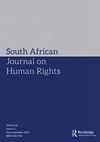How can talent management promote human rights, accelerate inclusion and advance persons with disabilities in the workplace?
IF 0.6
4区 社会学
Q3 LAW
引用次数: 0
Abstract
Abstract Persons with disabilities are amongst disadvantaged groups in society with rarer employment prospects compared to individuals without disabilities. Even if they meet the essential requirements of the job, advertisements may be inaccessible or otherwise inappropriate to facilitating their employment. When employed, they are not given full recognition like employees without disabilities and are not matched to the right positions that suites their needs. Additionally, they are not reasonable accommodated and provided with the necessary tools of trade. Consequently, entering the world of work is a challenge for them and when employed, they remain in lower positions with no career advancement and struggle to retain employment in South Africa. The above challenges are in violation of their human rights especially their right to work and talks to the challenges with talent management in the workplace. Against this background, this article examines, through doctrinal research methodology, the role of talent management towards the promotion of the rights of persons with disabilities in the workplace. It further explored pertinent legislative provisions relating to recruitment, selection and retention of employees and reasonable accommodation for the disabled. Based on the literature reviewed, it was established that talent management is a legislative requirement and that there is a nexus between talent management (which is the management discipline) and reasonable accommodation for persons with disabilities. Finally, recommendations were advanced towards the development of practical talent management initiatives to advance human rights and achieve inclusion of persons with disabilities in the workplace.人才管理如何在工作场所促进人权、加速包容和提升残疾人的地位?
摘要残疾人是社会中的弱势群体,与非残疾人相比,他们的就业前景更为渺茫。即使他们符合工作的基本要求,广告也可能无法访问或不适合为他们的就业提供便利。在就业时,他们没有像无残疾员工一样得到充分的认可,也没有适合他们需求的合适职位。此外,他们没有得到合理的照顾,也没有得到必要的贸易工具。因此,进入工作世界对他们来说是一个挑战,当他们就业时,他们的职位仍然较低,没有职业发展,很难在南非保住工作。上述挑战侵犯了他们的人权,尤其是他们的工作权,并谈到了工作场所人才管理方面的挑战。在此背景下,本文通过理论研究方法探讨了人才管理在促进残疾人工作场所权利方面的作用。它进一步探讨了有关招聘、选拔和留住雇员以及为残疾人提供合理便利的相关立法规定。根据查阅的文献,已经确定人才管理是一项立法要求,人才管理(即管理学科)与为残疾人提供合理便利之间存在联系。最后,提出了关于制定切实可行的人才管理举措的建议,以促进人权并实现残疾人融入工作场所。
本文章由计算机程序翻译,如有差异,请以英文原文为准。
求助全文
约1分钟内获得全文
求助全文

 求助内容:
求助内容: 应助结果提醒方式:
应助结果提醒方式:


